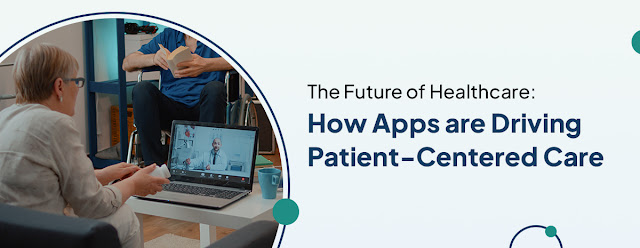The Future of Healthcare: How Apps are Driving Patient-Centered Care
Traditionally, healthcare has been a conventional industry. However, it is one of the final frontiers that is experiencing digitalization. Since healthcare has been conventionally slow in adopting new trends and shrouded in regulations, digitalization has been slow to permeate this industry. However, not for long as hospitals and healthcare are beginning to adapt to the rising technological trends and have begun integrating technology into their practices. Innovations like robot-assisted surgery and medical fraud detection technology have taken center stage in the healthcare industry. Still, the most notable use is that of apps driving patient-centered care. Let us first understand what patient-centered care means.
In the age of information technology, modern patients are more informed than ever about their health. They are more aware of the latest technologies that can transform their health and well-being. As a result, patients are experiencing new levels of quality in healthcare delivery, leading to a culture of patient-centered care involving both patients and providers.
According to the Institute of Medicine, patient-centered care is "care that is respectful and responsive to individual patient preferences, needs, and values." Patient-centered care involves a medical environment that encourages constant collaboration and clear communication between stakeholders. This includes families, patients, and all the parties involved, such as doctors, healthcare professionals, healthcare administrators, and others. Today, patients have the power to access their health data. They have the ability to research and can make informed decisions related to their treatment. This has resulted in improved patient outcomes and streamlined internal processes. This means reduced healthcare costs and better allocation of resources. Next, let us discuss how various apps are driving patient-centered care.
Artificial Intelligence (AI)
The advent of technology in the form of Healthcare App has led to patients accessing information faster than ever before. The increase in the use of artificial intelligence, AI-enabled apps, and technologies is tipping the scales in favor of the patient—the end-user in the healthcare system. AI is predicted to create $150 billion in annual savings by 2026. AI-enabled apps and AI overall can mean immense savings for the healthcare industry. Applications such as robot-assisted surgery, workflow assistants, and virtual nursing assistants are taking the market by storm now.
The healthcare market is quickly realizing how the benefits of AI can immensely outweigh the risks. The ways it impacts healthcare are endless. Currently, the top three successful healthcare apps taking the market now are robot-assisted surgery, virtual nursing assistants, and administrative workflow assistant.
With the help of image-based algorithms, AI experts have created a new generation of radiology tools for imaging. With the help of AI, it is also possible to conduct predictive data analysis, which can utilize health record data to identify infectious patterns. AI can thus be used to highlight at-risk patients and predict the dynamics of cancer in the human body. Therefore, with AI algorithms, valuable information on the population's health can be gathered, and the future of healthcare can be changed for the better.
Telemedicine
Telemedicine apps are making it big in the healthcare scenario today. With the help of telemedicine, obtaining care in their homes through various supported apps is possible. Videotelephony has made it possible for virtual interactions between healthcare professionals and patients. According to reports, the global telemedicine market was valued at $24.9 billion in 2016. It is expected to reach $113.1 billion by 2025. With the help of telemedicine apps, health professionals can evaluate, diagnose, and treat a patient remotely through telecommunication. This has become a blessing in disguise for several overburdened healthcare providers, especially primary care providers in the USA.
Augmented Reality (AR)
AR apps are the latest groundbreaking innovation in the healthcare market today. Today, through various apps and devices, AR is using the latest technologies to ease symptoms such as depression and anxiety in patients with mental illnesses. AR technology is also helping surgeons perform complex operations with ease. These apps are also being used to improve health and fitness among patients. AR apps are also bringing huge value to medical education. These apps allow students and trainee physicians to train in virtual scenarios that closely resemble the situation they will be treating. AR Medical Apps allow patients to precisely study patients anatomies before operating on them. Such apps also enable doctors to visualize internal organs without placing an incision. These apps also allow doctors to determine their patients' symptoms better and accurately determine their illnesses.
Digital Mental Health
We, humans, have invented technology for our comfort and leisure. While technology can relieve us from everyday stress, it can also cause immense harm. Nevertheless, digital mental health technology can reverse the damage it has caused and enable the delivery of mental healthcare in ways that could not be imagined before. With the help of digital devices such as mobile phones, wearables, and VR, health-tech companies are discovering groundbreaking ways to improve mental health and optimize care delivery.
Conclusion
Healthcare technology can improve the scope of healthcare exponentially in the future. With the help of Healthcare Apps for Patients, the vision of patient-centric healthcare has come one step closer to fruition. OmniMD believes everyone deserves access to high-quality healthcare, no matter where they are. To discover more about our healthcare apps and healthcare platforms for patients, visit www.omnimd.com for further information. Alternatively, email marketingmd@omnimd.com or call us at 1(844)666-4631 to talk to an expert.


Comments
Post a Comment